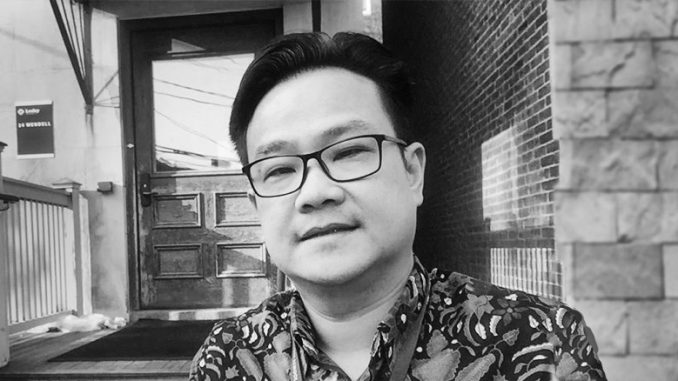
Due to the COVID-19 pandemic, since March 2020, every lecturer of my campus has been required to teach their students online. The teaching period, which ended in June 2020, was a respite of the sudden teaching-online situation. Being forced to lead and teach from a distance was tantamount to teaching-learning and leadership in a crisis. Leadership during a crisis, without being able to meet colleagues directly, is challenging due to the inevitable difficulties of indirect communications. Furthermore, teaching online in crisis lends itself to boredom and stress due to the ‘static’ nature of the teaching method.
Managerially during crisis, the top leaders including the Dean would need more online meetings to decide on and solve issues. The fact that my campus is a private university means that funding depends heavily on parents tuition fees. The governmental policy mandating that students learn from home meant that some parents would ask for a reduction in fees since their children were no longer utilizing campus facilities. The pressure of these requests spurred university management to give more to the students in order to make the funding from their parents worthwhile.
I researched servant leadership for my Ph.D. thesis and have been trying to implement the leadership approach in my daily enactment as a Dean. In this reflective paper, I will explain the concept of academic servant leadership and how I enacted it in leading my colleagues and teaching my class. Lastly, I will also reflect on how I should lead myself.

Academic Servant Leadership
The compulsory ‘Working-from-home’ rule mandated by the Ministry of Education in Indonesia caused student learning activities on campus to cease and therefore, academic leaders at my campus had to redesign their leadership strategies. Academic servant leadership is the practise of servant leadership in the academic world. In this paper, I would like to explain the others-first leadership being done by a Dean of the Faculty of Business and Economics.
Servant leadership is a philosophy that requires the leaders to understand and meet the needs of their followers (Wheeler, 2012). Academic leadership demands academic example and academic execution. Academic example explains the roles of the academic leader, while the latter explains the management of the academic activities. The roles of an academic leader like a Dean should be effective in doing this.
In the academic world, the followers of the academic servant leader can be classified into the direct followers and indirect followers. In my case, my direct followers are the heads of departments and my students who are registered in my class. My indirect followers are the heads of programs and all lecturers stationed in my faculty. There are two groups of followers that should be mentioned here: the overall students of the Faculty, and the ones who are taking my courses.
Tucker and Bryan (1991) suggest that an academic Dean has three important roles that could be explained as ‘dove’, ‘dragon’ and ‘diplomat’. As a ‘dove’, A Dean is expected to keep the peace within his or her faculty. ‘Dragon’ explains the Dean’s role as the protector of his or her colleagues. ‘Diplomat’ explains the role of the dean as the negotiator who should put the interest of his or her faculty first concerning the resources allocation of the university. Throughout this seven months of ‘COVID-19’ so far, I have experienced these three roles in the following: mediating a misunderstanding between two lecturers; protecting a colleague from the potential personnel-related problems; and, negotiating with the university for re-allocation of Faculty due to the pandemic.
Leading (Serving) my Colleagues
There are three major departments under the Faculty of Business and Economics, namely: Undergraduate Accounting Department (UAD), Undergraduate Management Department and Master of Management Program. Under the UAD there are three academic programs: business accounting, tax accounting and international business accounting. Under the UAM there are six academic programs: business management, hotel management, creative tourism, marketing, finance and investment and international business. These programs are being run in Bahasa (Indonesian) except for the International Business Accounting and International Business Management course.
The complexity of my leadership is indicated by the fact that I am leading eighty full-time lecturers who are stationed in ten academic departments. These ten departments have their own culture, strengths and weaknesses. My faculty is expected to maintain its status as the Faculty with the most students. In the past two decades, 40% of students at this campus were in my faculty. This means that I had to lead my colleagues so that they would serve their students at their best, and that these students could testify that they have learned a lot despite the limitation of Zoom or Google Meet classes. In other words, every lecturer is expected to make sure that they serve the students well while improving their academic quality.
Throughout this work-from-home period (March-Sept 2020), I have been trying to understand my colleagues needs and tried my best to fulfil them. Some of them shared difficulties in funding educational infrastructures needed for distance learning. Some struggled as they or their relatives were infected by the COVID-19. I would need to be empathetic towards these struggling colleagues. Sendjaya (2015) suggests that servant leaders should be authentic in serving their followers. In leading from afar, I also learned how to share my own anxieties during this situation. Listening and sharing should also be balanced by the act to edify the followers on things that they should not do.
This pandemic has forced me launch a performance management system that is both flexible and fixed. ‘Flexible’ means that it would be possible for every lecturer to work from home or the office on flexible working hours. ‘Fixed’ means that they would also need to know their performance targets in the form of student satisfaction, quality of their published papers, and the excellence of their community service. In this difficult situation, once the policy and target of work have been set, the academic leaders should do their part in serving these colleagues.
In serving their colleagues, academic leaders should listen to their followers and note their anxieties and difficulties. Furthermore, they are expected to motivate them and work together with them in order to fulfil their target together. I am still trying to do this for those who directly report to me. In my calculations, in order to lead 80 lecturers, my Faculty needs around 15 servant leaders. The leaders of these small groups are the ones who will serve those within their group by listening to their situation, designing how they should work and how should they be evaluated for their work.
Servant Leadership in my Class
Despite my leadership duties, I also teach several classes. In this paper, I would like to share my experience in teaching a course for the new batch called ‘Business Introduction’. The course is about introducing the students to the nature of business. This is not my first time handling the course, but certainly my first in teaching the course to semester one students who I have never met in person. The limitations of Zoom classes made me think of creative ways to teach these students. I begin the class by asking every student to introduce themselves by letting me know their names and their favourite movie.


Finding out about their favourite movie, to some extent, allows me to know more about them. This means I can recount relevant stories and offer jokes to make the Zoom class more engaging. In addition, listening to their stories is important prior to preparing my learning materials. This has allowed me to design appropriate individual tasks and group projects. In my business introduction class, I asked my students to take a photo of themselves having a meal and then explain the business aspects of their meal. The situation of the Zoom meeting has led me to count carefully how long should my students stay in the Zoom class.
I reflect that in this pandemic situation, due to the distance, a meaningful relationship with my students is very important. It helps me to transfer my knowledge to them most effectively. Secondly, the interaction is important for guiding them in completing their gradually assessed projects. Lastly, direct interaction is important in able to understand their own situation related to COVID-19 and to motivate them to be mindful and to give their best study effort.
Leading Myself
In order to serve others, servant leaders should be careful with their personal growth and this involves self-leadership. Bryant and Kazan (2013) argue that self-leadership is the practice of intentionally influencing one’s thinking, feeling and behaviors to achieve his or her objectives There must be a strong reason why an academician was willing to be an academic (servant) leader. The purification of their motivation does not happen overnight. It requires personal calibration in the form of daily reflection where they question the motives and the mission of a servant leader. Personal calibration such as this provides energy for the servant leader to keep serving while facing difficult situations.
I admit that daily reflection requires solid discipline. It is difficult because there are so many things that should be done while working from home and doing everything. Yet I still need to strengthen my self-leadership so that I can intentionally set aside some time for the personal recharging process. Secondly, I also find that it important to have few colleagues with whom I feel safe to share current issues and concerns. Sharing my ups and downs and their willingness to listen does not have to be at the expense of my performance evaluation. Lastly, as a Dean I also expect to experience the academic servant leadership from my subordinates.
Academic servant leaders should grow because they should serve their followers. In order to do so they need to have daily personal calibration (reflection), a support group and a servant leadership system that is being implemented from the top leaders. I put the leadership system as the last because I believe that they are not as important as the first two. I am expecting my superiors to be a servant leader for me, but I don’t put that expectation as a requirement for me to enact my academic servant leadership. I believe that being an academic servant leader is my calling and when my followers grow, I grow myself too.
Ricky Wang
Ricky Wang has been a lecturer at Petra Christian University since 1998 teaching business leadership, eventually becoming Academic Head of the International Business Management Program at the university. He has received two international scholarships, Fulbright and Honda leading to study spells in the US and Japan. The headship, lasting for eight years, necessitated learning more about Higher Educational Leadership, and following the headship, Ricky completed further studies in the UK being awarded a Doctoral of Education from the University of Birmingham in 2017. In 2018, he became the Dean of the Faculty of Business and Economics and the appointment was followed by study spells at the Harvard Institute of Higher Education and Yonsei University in South Korea.
References:
Bryant, A. and Kazan, A. L. (2013). Self-leadership: How to become a more successful, efficient, and effective leader from the inside out. New York: McGraw-Hill
Sendjaya, S. (2015). Personal and organizational excellence through Servant Leadership. Switzerland: Springer.
Tucker, A., & Bryan, R. A. (1991). Academic dean: dove, dragon, And diplomat, 2nd Ed. Wesport: Praeger
Wheeler, D. (2012). Servant leadership for higher education, principles and practice. San Francisco: John Wiley and Sons

